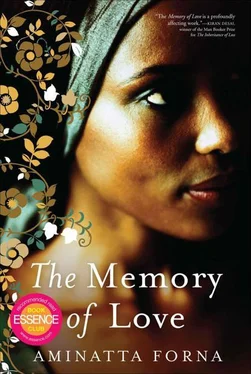‘You look well, Vanessa,’ I said.
‘Thank you, Elias. I came by to see how you are.’
‘As you see, I am well.’
‘Well, I’m pleased about that.’ She sounded as though she had heard different. I noticed her glance around the apartment. Then she said, ‘Maybe you would like to make me a coffee.’
I’d had no intention of offering her a coffee. Nevertheless, I reached around her and found the Nescafé and evaporated milk. I lit the gas ring and boiled water. I didn’t offer her any sugar.
‘Is it true you were arrested?’ she said.
‘No, it isn’t,’ I lied.
‘That’s what they say.’
‘Well, they are mistaken.’ I didn’t ask how she knew. It would have been exactly like Vanessa to have contacts among the police, a lover or two.
She watched me coolly. The cup of coffee sat on the counter.
‘Your coffee will get cold.’
‘It’s too bitter,’ she said, not taking her eyes off me. ‘So maybe it’s not such a bad thing for you; what happened to Julius?’
‘I don’t know what you mean,’ I said. ‘Julius was my friend. His death is a tragedy.’
She laughed, a short, soft and yet abrupt sound. ‘So his wife is a widow now.’ Her voice had taken on an insinuating sneer, which I didn’t like.
‘Yes,’ I said. ‘Saffia is mourning the loss of her husband.’
That laugh again.
‘Vanessa,’ I said. ‘I’m happy to see you. Come and visit again or I’ll come to you. Right now I’m due out.’
For a few moments she said nothing, but continued to regard me. And when she spoke, she enunciated each word, letting them slide suggestively out of her mouth one by one, poison drops. ‘Elias Cole. Look at your face.’
I refused to let Vanessa’s malicious little call unsettle me; still, it must have done so because later that day I thought I saw Julius. It was a momentary thing. Just a fellow who stepped out of a doorway, something in his profile. He walked on ahead of me and of course it wasn’t Julius at all. I could tell by the walk. And of course, Julius was dead. Still, the shock left me suddenly incapacitated; my knees buckled. It took me some minutes before I could recover and continue on my way.
The day I proposed to Saffia I arrived at the house just as she was dealing with a young hustler who was trying to pretend Julius had owed him money. A lie, of course. Julius had been gone nearly a year, but that didn’t stop people trying. I saw how tired she was beginning to look, how weary of it all. The grant money was just about to come to an end. I made my offer. A practical, rather than a romantic proposal, a compromise between my position and hers. I alluded to Julius. All the time I spoke I was aware of the aunt listening from the recesses of the house. Saffia asked for time to consider my offer. A month later I reiterated and this time Saffia accepted. As I left the house, I saw the aunt on her way back from the mosque. I told her the news, for I wanted to acquire the official seal of approval as soon as possible. The old woman’s face split into an obsequious grin such that I had the impression perhaps she had cared less for Julius than I had imagined.
The Dean, too, offered me his congratulations. He seemed genuinely pleased at the outcome. A few weeks later I was promoted to senior lecturer. And soon after that a house on the campus became available at short notice. The previous occupant had lost his job in the latest round of cuts. It was unfortunate, but these were the facts of life. I kept news of the house from Saffia until I had arranged to have it painted and the roof repaired where the rains had damaged the zinc.
Apropos of all that — Yansaneh, too, was one of the unlucky ones. I went to his leaving party, a sober affair attended by a sprinkling of his colleagues. In his address the Dean thanked Yansaneh for his commitment to the department. Yansaneh rose and said a few words. At one point he seemed overcome by emotion and fell silent, but then regained his voice and thanked several of his colleagues. Only later did it strike me he had made no reference to the Dean, whom convention might have required him to acknowledge. Afterwards people came up and patted him on the shoulder. I shook his hand and offered him my commiserations, but he merely muttered his thanks and kept his eyes fixed on his shoes.
I was sorry for Yansaneh, naturally. But nothing could dent my happiness.
The place name is familiar. This new route to the mental hospital is one Ileana has told Adrian about. It winds up the hill, past the villas of the wealthy, the army barracks and also this familiar name on a hand-painted sign for a hairdressing salon. Because he is in no hurry, Adrian turns the vehicle around the roundabout in the direction the sign points and heads down a track alongside a petrol station, where a number of young men are gathered in the shade of a high wall. They stare through the driver’s window as he passes, sullen and silent. The track narrows, the houses press in upon the street. He is driving slowly now, people make way for him. He pulls over for another car, easing his way around the corner of a building that juts into the road. Waiting for the other car to pass he sees the building is a covered market. Near by a woman sits behind a tray of fish, waving intermittently at the flies in the air. A pair of featherless chickens race in front of the car.
Now the road has opened out. In front of him is a dirt football ground, a tall tree and what looks like a school building on the far side. A game is about to begin, people are gathered in the road that borders the ground. A couple of them wave at him, indicating there’s no way through. One man in a long tunic approaches the vehicle, taps on the glass and points down another road. Adrian takes it without knowing where it leads. He is beginning to regret turning off the main road. At a crossroads at the end of the street the road to the right leads to a church and a dead end. Straight ahead the road appears too narrow for a vehicle to pass. So Adrian turns left, down the hill. The track is badly rutted now, with deep channels on either side. A pair of schoolchildren stand back to let him pass, their heels at the edge of the ditch. Fifty yards on there is another left turn and Adrian takes it, then changes his mind and decides to turn back. There is just enough space to execute a three-point turn, and he does so badly, tyres spinning on the gravel road, clutch whining. As he prepares to set off again, he notices the house. Small by the standards of the villas he passed on the road up the hill, it sits behind an iron gate. There is a doorway reached by a short flight of stairs. The walls are streaked dark green by water and pale by the sun. An overburdened orange tree grows in the front. It is not exactly as he imagined. For one, it sits higher on the land. But still there is enough for him to recognise it, though it is shrouded by trees, has not been painted in many years. This is the pink house.
Adrian climbs down and leaves the vehicle door open behind him. He walks up to the gates and looks through the railings. There is a side gate which looks like it might lead to a garden. It is hard to tell whether the house is occupied or abandoned, such is the state of neglect of so many buildings in the city. The front gate is closed and Adrian stops short of pushing it open. He turns away and climbs back inside the vehicle. At the end of the street he stops for the same pair of schoolchildren, a boy and a younger girl. They do not cross the road, but sidle down the length of the car, eyeing Adrian as they do so. He smiles at them and they do not smile back. He waves and the boy, who might be six, waves too. Adrian watches as they enter through the gate of the pink house.
Читать дальше












